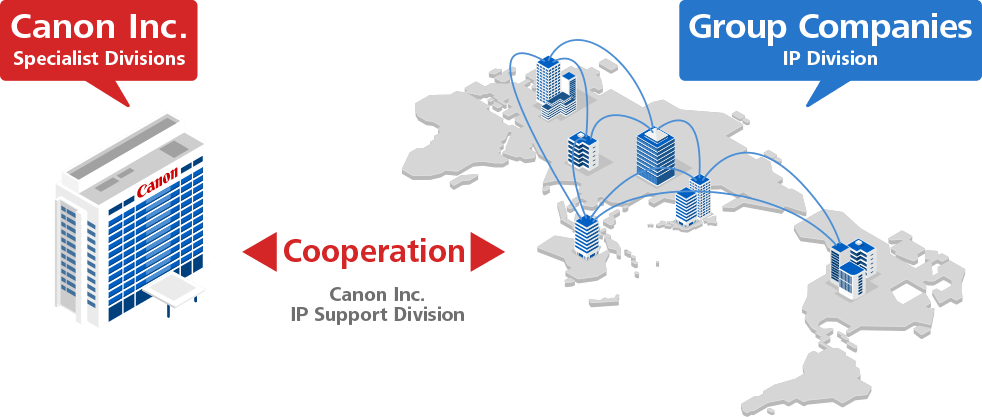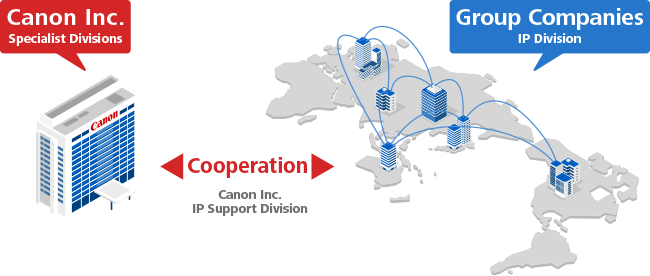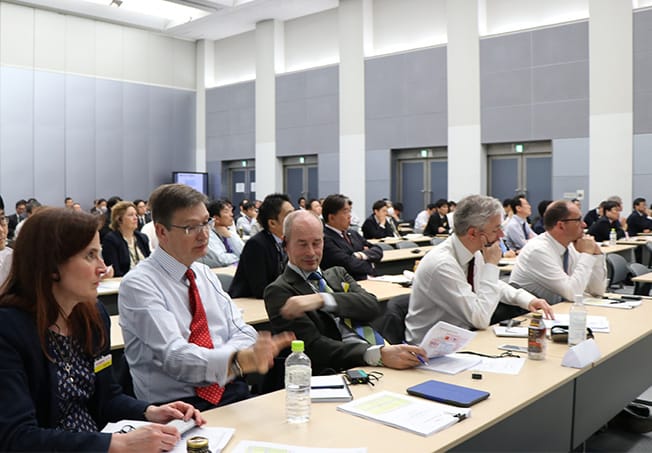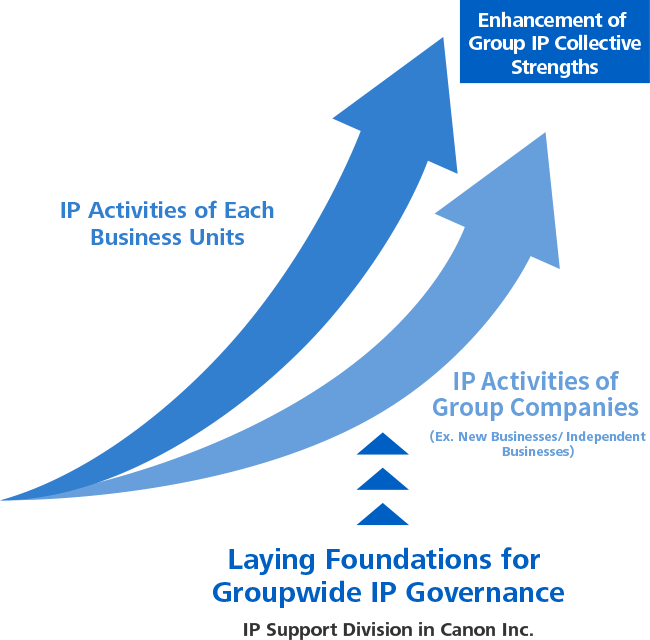Journey
Groupwide IP Support Work
Work Overview
At Canon, we endeavor to enhance the Group’s collective strengths in intellectual property by supporting each of our group companies around the world to develop their IP. As part of our corporate IP headquarters, we have therefore established a division which controls global IP management as a central point of contact to ensure a collaborative approach to IP activities between our group companies across the globe.
The division engages in a diverse range of tasks, from day-to-day consultations to IP management support, the process of IP integration following acquisition of a new group company, and human resources development. The specific nature of these tasks constantly changes depending on the environment surrounding the Canon Group. In order to be equipped to detect signs of change and respond with a broad outlook and flexible approach, the division brings together members with extensive backgrounds to act as IP consultants who draw upon their specialist knowledge to provide various forms of support in cooperation with each of the divisions of the Canon Group. The division’s three main tasks are.


Key points of business
(1) Laying the foundations for groupwide IP governance
The division strives to develop resilient IP foundations by providing mechanisms that serve as a mesh linking information and human connections across the group. One of the initiatives it pursues to do this is planning and running the Global IP Summit that brings together the heads of the IP divisions from each group company. The summit boosts the group’s collective IP strengths by enabling the group companies from their respective countries and regions to share their IP policies, strategies, and activities, thereby leading them to enjoy benefits of mutual development and also to exchange insights on recent trends.

The division also seeks to ensure the smooth implementation of various IP measures by proposing regulations on employee inventions and other aspects for devising an IP system, as well as developing a flow of operations for handling IP related to the R&D that companies outsource or conduct under contract. Furthermore, as part of initiatives to raise awareness and understanding of IP matters, the division visits group companies and works on cultivating a sense of the importance of IP awareness through activities such as sharing information on the various rules and training and examples of successes and failures.
(2) Supporting each industry-oriented business group’s collaborative IP initiatives
Canon Group pursues business activities in four industry-oriented groups—namely, the printing, medical, imaging, and industrial business groups—and develops new fields such as independent businesses and R&D.
As we seek to develop and pursue an IP strategy that is suited to the composition of a given industry-oriented group, we conduct analysis of the IP environment for each individual company in the industry-based group with a specific focus on the company’s markets and initiatives to gain advantage over its competitors. When pursuing these activities, it is important to identify common challenges, set out a patent portfolio strategy for each field and ensure that we are all working toward the same goals. The division assists these collaborative initiatives by drawing on the know-how that we have cultivated through supporting group companies over the years.

(3) Providing IP support for independent businesses and individual projects by group companies
As they develop new fields, group companies pursue an increasingly diverse range of activities, such as M&A or the establishment of independent businesses. The division serves as an IP consultant, proposing support suited to each company’s venture phase and providing assistance in cooperation with the specialist divisions.
Case 1: Developing an IP management framework in conjunction with an M&A
When a company joins the group by M&A, it is necessary to develop an IP management system in line with the relevant country’s patent law and laws regulating technology while steps are being taken to clarify the relationship of the corporate divisions with the new company. Given the differing approaches to IP, we consider the circumstances of each company and provide ongoing guidance as we work to ensure the application of Canon’s approaches and rules.
Case 2: Developing independent businesses and new fields and establishing new ventures
We work with the Canon Inc. divisions that acquire patents and divisions that handle contracts to provide advice to the IP divisions and operating divisions of group companies on the development of the patent portfolio required for a new venture and on acquiring valid rights and the timing for doing so. We also respond to enquiries on aspects such as proposing marketing from a new perspective, research of relevant markets, means of utilizing the IP landscape, and gathering necessary information.
Case 3: Handling IP rights in the event of withdrawing from/transferring a venture
When Canon Group withdraws from or transfers the rights of a venture that it owns, we seek to ensure the smooth transfer of assets by cooperating with the division handling financial aspects to assist in appraising the value of IP rights and other such tasks. We also provide consultation on and support efforts to coordinate matters such as the Canon Group’s decisions on which company holds the rights.
As shown here, providing IP support for the group companies encompasses a wide range of tasks and entails interacting with many divisions. The highlights of such work are the potential to encounter new cases each day and for the individual companies to cooperate with each other in a range of fields above and beyond IP.
If a Japanese corporation adopts an exclusively Japanese perspective focused entirely on Japan, it cannot make progress in developing a common global approach. As the division of a global corporation, it is our role to draw on the distinctive qualities of each group company to ascertain the possibilities and unique strengths of Canon Group particularly in terms of IP and apply this to adopt the optimum measures for the Group as a whole.
